Alerts
The Special Poster Presentation award was delivered to Deborah Lynn Amos
During the Targeting Microbiota 2018 congress, the Scientific Committee awarded Deborah Lynn Amos from Marshall University, USA for her Poster presentation entitled "Synergistic effects of sports, antioxidant and microbiota".
The Short Oral Contribution award was delivered to Dr. Julie Reygner
During the Targeting Microbiota 2018 congress, the Scientific Committee awarded Dr. Julie Reygner from Université Paris Descartes - Faculté de Pharmacie, France for her Short Oral communication entitled "A new freeze-dried formulation to conserve stools over 12 months for fecal transplantation".
Microbiota & Medicine of Tomorrow - The Revolution: Comments by Prof. Marvin Edeas
The chairman of the scientific committee of the International Society of Microbiota (ISM), Prof. Marvin Edeas (Institut Cochin, Université Paris Descartes, France), explained the new topics of the 7th edition of Targeting Microbiota. The Microbiota and microbiome transforming deeply our understanding of Medicine of tomorrow. It is really a revolution which allow us to re-think and re-design our strategies about the way we will prevent and treat many diseases and pathologies.
Among the strategic questions which will debated:
- how all big data generated by microbiota sequencing can be used?
- Can we talk about Artificial Intelligence and microbiota medicine?
Other topics which are important to discuss with the scientific committee are the many tests and devices in the market (which target the general public) to collect, sequence and analyse human (and animals) Microbiota. They propose systematically the utilisation of huge amount of probiotics and products.
Prof. Peter C. Konturek - President of ISM will highlight many questions during the 7th edition of Targeting Microbiota 2019.
- Can we modulate the quality and diversity of human microbiota?
- How to induce durable beneficial changes in gut microbiota?
- Where is the red line of the gut microbiota manipulation?
- What are the strategic mediators of gut microbiota?
- How to understand better the role of bacterial metabolites?
- What is the perfect microbiota "signature" and how to use it as a biomarker to "predict" and/or treat many diseases?
- What is the influence of gut microbiota on the development and progression of chronic diseases?
Order the Abstracts book of Targeting Microbiota 2018 Congress
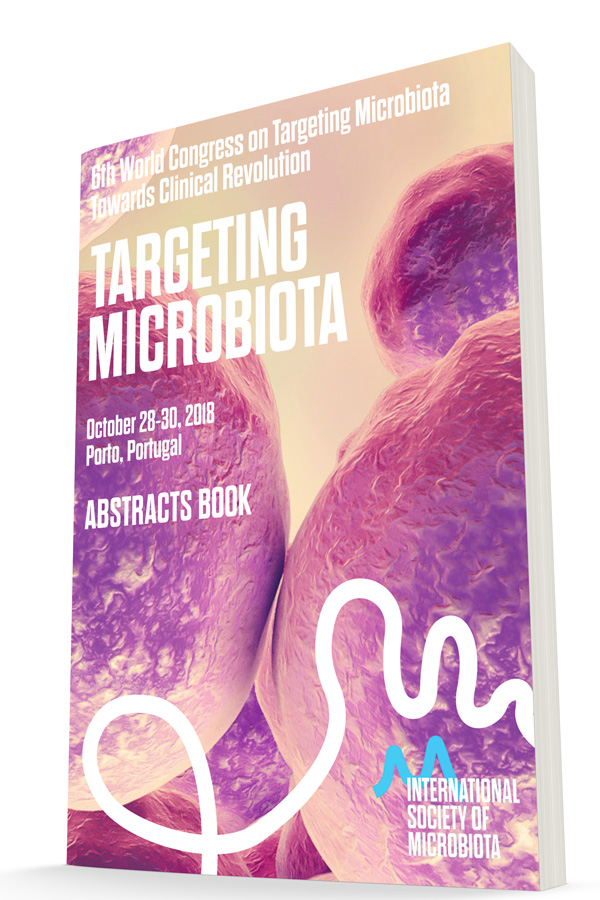 The Abstracts Book of Targerting Microbiota 2018 are available for order. The Abstracts Book contains all the Major, Short and Poster presentation presented during the congress.
The Abstracts Book of Targerting Microbiota 2018 are available for order. The Abstracts Book contains all the Major, Short and Poster presentation presented during the congress.
If you cannot participate to the congress and you would like to order the abstracts book, please click here. ![]()
Microbiota sequencing, Big Data interpretation and Artificial Intelligence: myth or reality?
 Among the hot topics of Targeting Microbiota 2018 will be Microbiota and Artificial Intelligence. The aim of this discussion is to connect all the key actors involved in microbiota assessment and analysis: mathematician, computer scientists, bioinformatician, clinician, academics and industrials in order to initiate the discussion about sequencing, big data generating and how to integrate artificial intelligence into microbiota analysis interpretation.
Among the hot topics of Targeting Microbiota 2018 will be Microbiota and Artificial Intelligence. The aim of this discussion is to connect all the key actors involved in microbiota assessment and analysis: mathematician, computer scientists, bioinformatician, clinician, academics and industrials in order to initiate the discussion about sequencing, big data generating and how to integrate artificial intelligence into microbiota analysis interpretation.
Exploring the role of gut dysbiosis in neuroinflammation and hypertension
 Prof. David Durgan from Baylor College of Medicine, USA will give a strategic presentation during the 6th World Congress on Targeting Microbiota 2018 about "Exploring the role of gut dysbiosis in neuroinflammation and hypertension" during the congress.
Prof. David Durgan from Baylor College of Medicine, USA will give a strategic presentation during the 6th World Congress on Targeting Microbiota 2018 about "Exploring the role of gut dysbiosis in neuroinflammation and hypertension" during the congress.
According to Prof. Durgan: "Hypertension is one of the most prevalent risk factors for the development of cardiovascular disease. We have demonstrated that multiple models of hypertension exhibit gut dysbiosis, and that dysbiosis plays a causal role in the development of hypertension. We have found that this involves neuroinflammation, and are currently examining a potential microbiota-gut-brain axis involved in blood pressure regulation. Our studies demonstrate that treatments to prevent or reverse gut dysbiosis may be valuable in the treatment of hypertension."
To know more about Targeting Microbiota 2018 Congress: www.microbota-site.com
Role of microbes in stem cells transplantation related complication

Prof. Ernst Holler from University Hospital Regensburg, Germany will join the 6th World Congress on Targeting Microbiota 2018 and will talk about "Role of microbes in stem cells transplantation related complication" during the congress.
Summary of presentation: "Haematopoietic stem cell transplantation is a curative treatment optionin patients with leukemia but can be complicated by life threatenningGraft-versus-Host Disease (GvHD) especially in the gastrointestinal (GI)tract. In the last 5 years, early and severe disruption of theintestinal microbiota has been identified as a major risk factor ofGI-GvHD. Broad spectrum antibiotics applied for neutropenic infectionsbut also destruction of Paneth cells by GvHD itself are major factorsresulting in dysbiosis which strongly enhances intestinal inflammationinduced by donor cells. Lack of protective metabolites such as shortchain fatty acids and indoles produced by commensal explains thisassociation but direct microbiota – T cell interactions maycontribute. Restoration of a protective microbiome may become analternative approach for treatment and prevention of GI-GvHD."
To know more about Targeting Microbiota 2018 Congress, please check the Agenda here
Individual differences in the microbiome and metabolome during circadian misalignment and sleep restriction

Prof. Kenneth Wright from the University of Colorado Boulder, USA will give a short oral presentation on Individual differences in the microbiome and metabolome during circadian misalignment and sleep restriction: associations with the ability to maintain wakefulness during 6th World Congress on Targeting Microbiota 2018 Congress which will be held in Porto, on October 28-30, 2018.
Summary of presentation: "Circadian and sleep disruption are common in modern society with round the clock work operations in shift-workers and due to many people sleeping less than the recommended amount of hours each night. Circadian misalignment—behaviors such as wakefulness-sleep and energy intake-fasting that occur at inappropriate internal biological times—and sleep loss are ideal conditions under which to study the microbiota-gut-brain axis as circadian misalignment and sleep loss are associated with gastrointestinal distress, metabolic dysregulation, and cognitive impairment. Findings from a study aimed to determine the influence of circadian and sleep disruption on 1) the microbiota-gut-brain axis, 2) the stability of individual differences in the microbiome, the microbiome metabolome, and human host physiology/behavior, and 3) associations between alterations in microbiome metabolome with an objective measure of alertness will be presented."
For more information: www.microbiota-site.com
Sepsis and microbiota : obstacles, recent advances and strategies
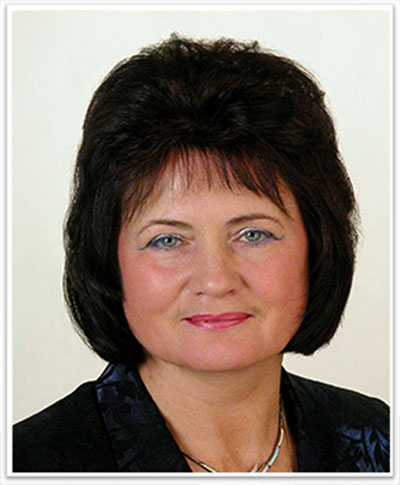
Dr. Natalia Beloborodova from Negovsky Research Institute of General Reanimatology, russia will join the Targeting Microbiota 2018 congress and will talk about link between Sepsis and Microbiota during her presentation "Sepsis and Microbiota : obstacles, recent advances and strategies".
According to her: "Today sepsis is seen as a life-threatening organ dysfunction caused by the dysregulation of the host response to Infection, but microbiota and their function of maintaining host metabolic homeostasis remain out of sight. In septic patients, the microbial "metabolic conveyor" of the intestine is disturbed, which leads to an excess of metabolic intermediates . The most pathogenetically significant disorders in sepsis may be associated with a violation of biodegradation of metabolites of aromatic amino acids. Some intermediate metabolites accumulated in the blood, which correlated with the progression of multiple organ failure, septic shock and death. We believe that microbiota dysfunction as an invisible organ and disruption of biodegradation of aromatic amino acid products of metabolism is a key mechanism in the development and outcome of sepsis. It is time to look for a targeted strategy to regulate microbiota signaling molecules for survival in sepsis."
To know more about Targeting Microbiota 2018 Congress: www.microbota-site.com
Honor thy lodgers? - Interactions between the Built Environment Microbiome and the Human Microbiome
 Prof. Markus Egert from Furtwangen University, Germany will talk about "Honor thy lodgers? - Interactions between the Built Environment Microbiome and the Human Microbiome" during the Targeting Microbiota 2018 Congress, which will be held in Porto, in October 28-30, 2018.
Prof. Markus Egert from Furtwangen University, Germany will talk about "Honor thy lodgers? - Interactions between the Built Environment Microbiome and the Human Microbiome" during the Targeting Microbiota 2018 Congress, which will be held in Porto, in October 28-30, 2018.
Summary of presentation: The Built Environment (BE) represents all man-made structures, features, and facilities in which people live, work, recreate and travel. The BE microbiome comprises thousands of microbial species, originating from soil, air, water, food, animals and in particular the human inhabitants themselves. While it is safe to assume that the BE microbiome is of great importance for human health, especially functional insight is lacking here. However, a deeper understanding of the functional interactions between the BE microbiome and the human microbiome is needed in order to develop health-promoting microbial management strategies for the BE, which should comprise antimicrobial and probiotic measures in a well-balanced manner.
For more information: www.microbiota-site.com
The impact of antibiotic treatment on the human microbiota – A review of the clinical implications
 Dr. Maria Vehreschild from University Hospital of Cologne, Germany will join the 6th World Congress on Targeting Microbiota 2018 Congress and give presentation about "The impact of antibiotic treatment on the human microbiota – A review of the clinical implications".
Dr. Maria Vehreschild from University Hospital of Cologne, Germany will join the 6th World Congress on Targeting Microbiota 2018 Congress and give presentation about "The impact of antibiotic treatment on the human microbiota – A review of the clinical implications".
"Recent advances in microbiome research have shown that exposure to antibiotics can have a significant impact on clinically relevant outcome parameters. In this presentation, the available evidence on this issue will be reviewed and discussed in depth."
Targeting Microbiota 2018
www.microbota-site.com
Using germfree animal models to prove the role of the gut microbiota in liver diseases
 Dr. Philippe Gérard from INRA, France will talk about "Using germfree animal models to prove the role of the gut microbiota in liver diseases" during 6th World Congress on Targeting Microbiota 2018 Congress which will be held in October 28-30, 2018, at Porto, Portugal.
Dr. Philippe Gérard from INRA, France will talk about "Using germfree animal models to prove the role of the gut microbiota in liver diseases" during 6th World Congress on Targeting Microbiota 2018 Congress which will be held in October 28-30, 2018, at Porto, Portugal.
Summary of talk: The portal vein conducts blood from the gastrointestinal tract to the liver which is thus one of the main organ that can be influenced by microbiome composition and activities. Nonalcoholic and alcoholic fatty liver disease (NAFLD and ALD, respectively) refers to a spectrum of liver damage ranging from simple steatosis to non-alcoholic steatohepatitis, advanced fibrosis, cirrhosis or even hepatocellular carcinoma. Using microbiota transplants from conventional mice or human alcoholic patients to germ-free mice, we demonstrated that the gut microbiota determines development of NAFLD and that the individual susceptibility to ALD may be driven by intestinal bacteria. This suggests that targeting the gut microbiota could be a new prevention or therapeutic approach for liver diseases management.
For more information: www.microbiota-site.com
Can gut phages be used to improve the health of stunted children?

During the 6th World Congress on Targeting Microbiota 2018 which will be held at Porto, Portugal, in October 28-30, 2018, Dr Mohammadali Khan Mirzaei from McGill University, Canada will present his research on "Role of gut phages in child stunting".
Short summary: "Child stunting is a significant health concern in low and middle-income countries. Delayed and reduced growth or stunting results from nutrition deficiencies, genetics, and an altered gut microbiota. Recent studies have shown that gut bacteria of stunted children are different from their normal counterparts, generally with lower Firmicutes/Proteobacteria ratio. While the role of bacteriophages (phages for short) in regulating bacterial populations in the environment is well studied, their role in gut dysbiosis is unknown. In collaboration with the International Centre for Diarrhoeal Disease Research, Bangladesh, we have studied the role of phages in healthy and stunted children from Bangladesh. The main goal of our study is to determine if gut phages can be used to manipulate gut bacterial communities to improve the health of stunted children."
Targeting Microbiota 2018
www.microbota-site.com
Recent advances on the relation between the microbiome-gut-brain axis and the neurodegenerative diseases
 Maria Cecilia Giron from University of Padova, Italy will talk about "Recent advances on the relation between the microbiome-gut-brain axis and the neurodegenerative diseases" during the 6th World Congress on Targeting Microbiota 2018 Congress.
Maria Cecilia Giron from University of Padova, Italy will talk about "Recent advances on the relation between the microbiome-gut-brain axis and the neurodegenerative diseases" during the 6th World Congress on Targeting Microbiota 2018 Congress.
"In the last decade, emerging evidence has revealed the presence of an intense dialogue between the brain and the gastrointestinal system, the so-called brain-gut axis. Disruption of this complex relationship has been shown to be associated to the pathogenesis of several disorders, ranging from irritable bowel syndrome (IBS) and inflammatory bowel disease (IBD), to depression, anxiety, dementia and Parkinson’s disease.
We have demonstrated that gut dysbiosis affects functional and structural integrity of the enteric nervous system. We are currently examining a potential microbiota-gut-brain axis involved in neuroplasticity and neurodegeneration. Deciphering the interactive dialogue that occurs between microorganisms in the gut and the activity of the immune system regulated by Toll-like receptors is crucial for the discovery and the development of compounds such as pharma- and nutraceuticals (including syn-, pre- and probiotics), critical for preserving or restoring homeostasis in the gut as well as in the central nervous system."
Targeting Microbiota 2018
www.microbota-site.com
Link between microbiota & visceral pain: role of bioactive lipids
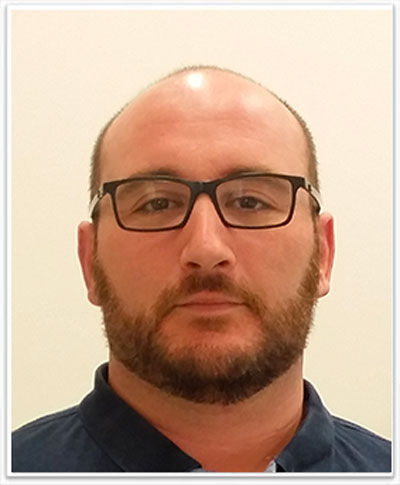
Dr. Nicolas Cenac from Inserm, France will join the 6th World Congress on Targeting Microbiota 2018 Congress and give presentation about "Link between microbiota & visceral pain: role of bioactive lipids".
"Impairment in the composition and diversity of this microbiota have been observed in pathologies of digestive tract such as irritable bowel syndrome (IBS). In order to study the impact of bacteria on the most deleterious IBS symptoms, visceral pain, we used several approaches in mass spectrometry to analyze bacterial lipids. We highlighted the production by bacteria of lipopeptides able to cross the intestinal barrier to regulate sensory neurons. In addition, we characterized several long chain fatty acid (LCFA) modifying the production of pro-algesic molecules by intestinal epithelial cells. These works allowed us to demonstrate that bacteria from the microbiota, by secreting lipopeptides and LCFAs, could signal directly or via the epithelium to sensory neurons."
For more information: www.microbiota-site.com
Crosstalk between Gut Microbiota, Innate Immune Cells and Endocrine Cells in the Pancreas Regulates Autoimmune Diabetes
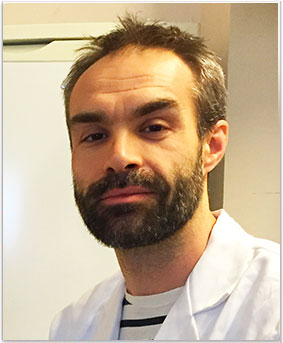 Dr. Julien Diana from Institut National de la Santé et de la Recherche Médicale (INSERM), Paris, France will present his study entitled "Crosstalk between Gut Microbiota, Innate Immune Cells and Endocrine Cells in the Pancreas Regulates Autoimmune Diabetes" during the Targeting Microbiota 2018 Congress, which will be held in Porto, in October 28-30, 2018.
Dr. Julien Diana from Institut National de la Santé et de la Recherche Médicale (INSERM), Paris, France will present his study entitled "Crosstalk between Gut Microbiota, Innate Immune Cells and Endocrine Cells in the Pancreas Regulates Autoimmune Diabetes" during the Targeting Microbiota 2018 Congress, which will be held in Porto, in October 28-30, 2018.
In his presentation, Dr. Diana will highlight: "The gut microbiota is essential for the normal function of the gut immune system. However how the gut microbiota prevents autoimmunity in distant organs remains poorly defined. Our group recently described that the gut microbiota controls the production of antimicrobial peptides (AMPs) by the pancreatic endocrine cells. Importantly, owing to their immunoregulatory properties, AMPs are critical to maintain the immune tolerance in the pancreas. In the NOD mice, a mouse model of autoimmune diabetes, we demonstrated that dysbiosis leads to a defective production of AMPs in the pancreas and to the development of the disease. Our findings reveal a novel interplay between the gut microbiota, the endocrine cells and the immune system that contributes in preventing autoimmune diabetes.”
For more information: www.microbiota-site.com
MAIT cells (Mucosal-Associated Invariant T cells) in liver disease and antibacterial response
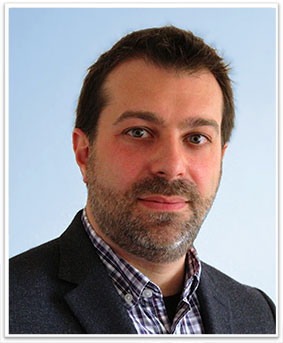 Dr. Antonio Riva from Institute of Hepatology London, Foundation for Liver Research, United Kingdom will join the Porto Microbiota 2018 Congress which will be held in October 28-30, 2018, at Porto, Portugal and will give presentation entitled "MAIT cells (Mucosal-Associated Invariant T cells) in liver disease and antibacterial response".
Dr. Antonio Riva from Institute of Hepatology London, Foundation for Liver Research, United Kingdom will join the Porto Microbiota 2018 Congress which will be held in October 28-30, 2018, at Porto, Portugal and will give presentation entitled "MAIT cells (Mucosal-Associated Invariant T cells) in liver disease and antibacterial response".
Summary of presentation: "The liver is an immunologically active filter that clears the portal blood of food antigens, nutrients and chemical/cellular compounds produced or released by the gut microbiota. With increasing severity of liver disease not only is this ability progressively lost, but we also observe changes in the gut flora, increased gut permeability, increased gut bacterial translocation, a progressive immune deterioration, and increasing susceptibility to bacterial infections that represent a major cause of death in patients with advanced liver disease.
MAIT cells are essential players of the antibacterial immunity and their tissue distribution is intimately linked to the gut-liver axis. Indeed, MAIT cells are highly enriched in the liver and recirculate between the liver and the gut via the portal and the peripheral circulation.
We were the first to describe MAIT cell alterations in alcoholic liver disease and to show that these alterations are gut-related, and we believe that MAIT cell defects are crucial in the dysfunctional antibacterial immunity observed in patients with liver disease."
The relationship between the microbiota, immune system and behaviour
 Paul Forsythe from McMaster University, Canada will join the Porto Microbiota 2018 Congress which will be held in October 28-30, 2018, at Porto, Portugal and will talk about "Psycho neuro immunology and gut microbes" during the congress.
Paul Forsythe from McMaster University, Canada will join the Porto Microbiota 2018 Congress which will be held in October 28-30, 2018, at Porto, Portugal and will talk about "Psycho neuro immunology and gut microbes" during the congress.
Paul Forsythe highlighted: "There is increasing evidence that gut microbes can influence brain chemistry and function, and disruption of the microbiota may contribute to neuro-developmental and mood disorders. However, the mechanisms underlying communication between gut microbes and the brain are complex and still poorly understood. This presentation will focus on the relationship between the microbiota, immune system and behaviour, describing recent experiments that highlight gut microbes as key agents in psychoneuroimmunology."
For more information: www.microbiota-site.com
What are the effects of gut bacterial metabolites on cardiovascular risk?
 Dr Marcin Ufnal from Medical University of Warsaw, Poland will join the Porto Microbiota 2018 Congress which will be held in October 28-30, 2018, at Porto, Portugal and will talk about "The effect of gut bacterial metabolites on cardiovascular risk" during the congress.
Dr Marcin Ufnal from Medical University of Warsaw, Poland will join the Porto Microbiota 2018 Congress which will be held in October 28-30, 2018, at Porto, Portugal and will talk about "The effect of gut bacterial metabolites on cardiovascular risk" during the congress.
Dr Ufnal will highlight: "Gut bacteria-produced compounds enter the bloodstream and affect the circulatory system. For example, trimethylamine N-oxide (TMAO), a gut bacteria metabolite of L-carnitine and choline, has recently emerged as a new diagnostic marker and mediator of increased cardiovascular risk. However, the mechanism is not clear.Recently we have found that high sodium intake and treatment with ACE-inhibitors affect blood concentration of TMAO in rats. This suggests that plasma level of gut bacterial metabolites may correlate with interventions modifying cardiovascular risk."
For more information: www.microbiota-site.com
Microbiota & Medicine of Tomorrow: Big data, Artificial Intelligence and Revolution
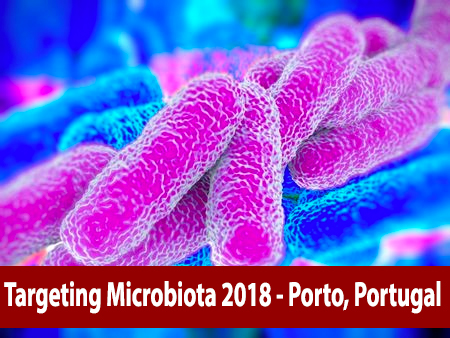 Prof. Marvin Edeas, Institut Cochin, Université Paris Descartes, France, as founder of the International Society of Microbiota (ISM) and member of the scientific steering board, delivered his vision about the next ISM meeting:
Prof. Marvin Edeas, Institut Cochin, Université Paris Descartes, France, as founder of the International Society of Microbiota (ISM) and member of the scientific steering board, delivered his vision about the next ISM meeting:
"...We wish to connect and bridge all pathologies (cardiovascular, neurodegenerative, metabolic diseases, cancer and ageing) to microbiota (diversity) to find new strategies.
We want to initiate a new way of thinking, and how to integrate Microbiota Medicine, Big data generated by gut microbiota sequencing and Artificial Intelligence.
This ambitious project needs a multi Task Force. We need to open new "doors" to medicine of tomorrow and anticipate in this field.
I wish also to highlight the strategies to modulate the quality of microbiota by phages and the strategic intertalk with mitochondria.
The field of phagotherapy and microbiota will be largely discussed during Porto Microbiota 2018.
The other hot topic will be the exact role of short chain fatty acids and H2S. These key factors will modulate mitochondria activity ..."
The 6th World Congress on Targeting Microbiota will be organized in Porto, Portugal in October 28-30, 2018.
For more information: www.microbiota-site.com
The sunny city of Porto will host the 6th World Congress on Targeting Microbiota in October 28-30, 2018.
 The scientific and organizing committee of the International Society of Microbiota informed you that the 6th World Congress on Targeting Microbiota, was relocated at the Hotel Crowne Plaza, Porto, Portugal and will be held on October 28-30, 2018.
The scientific and organizing committee of the International Society of Microbiota informed you that the 6th World Congress on Targeting Microbiota, was relocated at the Hotel Crowne Plaza, Porto, Portugal and will be held on October 28-30, 2018.
You can acces the preliminary agenda by clicking here.
For more information, please don't hesitate to contact us.
More Articles...
- Food & Microbiota 2018: What are the three strategic questions?
- Food & Microbiota 2018: The first symposium will be organized in June 14
- Report of the 5th ISM Berlin Microbiota Congress 2017
- ISM communication award 2017 for a presentation about Exploring the gut microbiome role in Parkinson’s disease and in primary parkinsonisms






















































